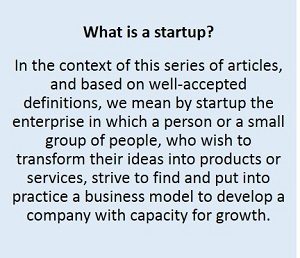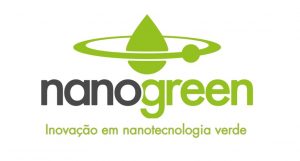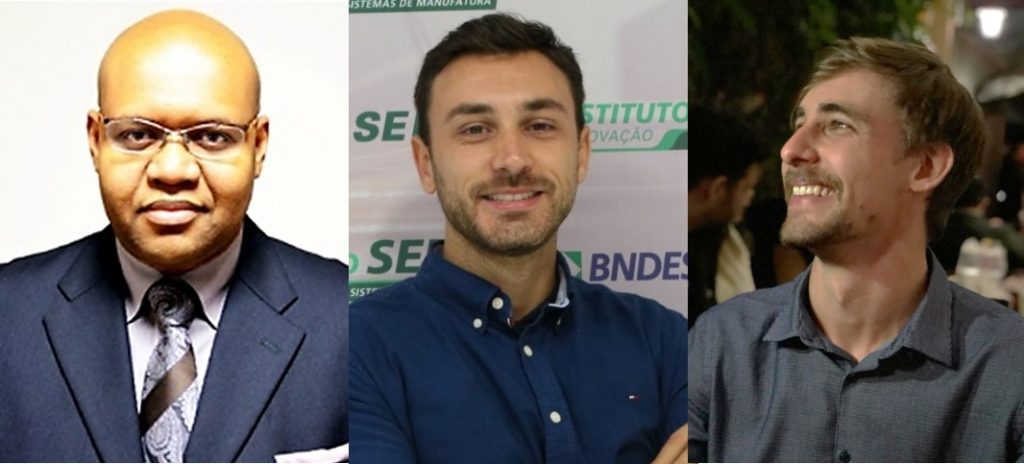A little bit of the brief and intense story of the startup Nanogreen (Joinville, SC) and the vision of its entrepreneurs.
 Nanogreen is a startup committed to participating in the emerging Brazilian market of nanoparticle production. These particles, measuring less than 100 nanometers in at least one of their dimensions, have unique properties due to their size, and are capable of conferring interesting properties to the materials to which they are incorporated. In addition to being the subject of intense research, nanoparticles are already used to manufacture a wide range of products, from socks to milk containers, in addition to paints and sensors – a market whose size is still difficult to determine but which moves billions of dollars around the world.
Nanogreen is a startup committed to participating in the emerging Brazilian market of nanoparticle production. These particles, measuring less than 100 nanometers in at least one of their dimensions, have unique properties due to their size, and are capable of conferring interesting properties to the materials to which they are incorporated. In addition to being the subject of intense research, nanoparticles are already used to manufacture a wide range of products, from socks to milk containers, in addition to paints and sensors – a market whose size is still difficult to determine but which moves billions of dollars around the world.
At Nanogreen, the main competitive advantage in a national context is the nanoparticle manufacturing method, based on the laser ablation technique. Briefly, it consists of using samples of the material that will compose the nanoparticles (e.g. titanium or gold) as targets of the laser. The samples are submerged in liquid and the laser light beam is placed over them. The radiation removes material from the surface of the target, and finally, the ablated material forms the nanoparticles in the liquid medium.
Innovative in the Brazilian industrial context, this method, which is based on technologies in the public domain (not protected by patents) stands out for its low environmental impact, without the use of toxic substances. In addition, the method can generate nanoparticles from the most diverse materials, including metals, polymers, ceramics and even organic materials (Nanogreen is testing tree barks, for example). Finally, through changes in the process parameters and the production medium (distilled water, alcohol, solvent etc.), it is possible to alter the size and distribution of the nanoparticles, the state of agglomeration, the composition of the final product, and also functionalize the surface of the particles according to the customer’s needs.
 Nanogreen currently works with customized development of nanoparticles for the client’s desired application. “We perform a joint development, in order to find the best solution, working in the form of consulting and development. Subsequently, we sell the made-to-order products developed,” says Moisés Teixeira. For the future, the entrepreneurs of Nanogreen plan to have a portfolio of products developed, ready to be manufactured on demand. “This will allow us to focus only on supply, or to maintain both fronts. All of this will depend on how the market and technology behaves, but these are scenes of the next chapters,” he adds. Generating patents from the development work is also a possibility contemplated by the entrepreneurs of Nanogreen.
Nanogreen currently works with customized development of nanoparticles for the client’s desired application. “We perform a joint development, in order to find the best solution, working in the form of consulting and development. Subsequently, we sell the made-to-order products developed,” says Moisés Teixeira. For the future, the entrepreneurs of Nanogreen plan to have a portfolio of products developed, ready to be manufactured on demand. “This will allow us to focus only on supply, or to maintain both fronts. All of this will depend on how the market and technology behaves, but these are scenes of the next chapters,” he adds. Generating patents from the development work is also a possibility contemplated by the entrepreneurs of Nanogreen.
The startup staff currently consists of three members who gather together academic training and research and development experience in laser and nanoparticle production techniques. For everyone, Nanogreen was the first experience of creating a company. The partner Edson Costa Santos holds a degree from the Brazilian Federal University of Santa Catarina (UFSC) and master’s degree and doctorate from Osaka University, Japan, both in Mechanical Engineering. At Nanogreen, he works in business development and strategic contacts. In addition to being CEO of Nanogreen, Costa Santos is currently senior manager of innovation at Carl Zeiss AG in Germany. The second active partner, Moisés Felipe Teixeira, who holds a degree, a master’s degree and a doctorate degree in Materials Science and Engineering from UFSC, is responsible for the administration of the company. The team also includes the grant holder Lucas Bóries Fachin, chemical engineer from UFSC, who works with product development and research of new materials.
In terms of infrastructure, Nanogreen needs a series of manufacturing and characterization equipment that the startup is not able to acquire. However, these entrepreneurs have overcome this difficulty through partnerships and agreements with research institutions and universities, as well as payment outsourcing of machine hours and analysis. According to the entrepreneurs, the idea is to acquire, as soon as possible, equipment for the manufacture of nanoparticles by means of public funding, external investors or bank loans.
Emergence of the startup
The idea of working with laser ablation came around ten years ago, from the experience of the partner Edson Costa Santos with laser technologies, during his doctorate in Japan. However, the first products were developed in Brazil about three years ago on an experimental basis within SENAI Institute of Innovation, where Costa Santos was director. By having direct contact with that technology, the entrepreneurs saw the business potential. “Since the SENAI Institute’s focus is not on the type of sale and business we are doing today, the creation of the company was the best way to bring this technology to the Brazilian market,” says Costa Santos.
A milestone in the brief history of Nanogreen was the incubation approval at the Technological Innovation Park of Joinville and Region (Inovaparq), in 2016. At that time, the partners incubated “only” an idea, which arose when they saw the lack of suppliers of nanoparticles of some materials, together with the low level of customization that traditional suppliers offered. The entrepreneurs of Nanogreen wanted to bring to Brazil a different way of manufacturing and supplying nanoparticulated products. “We combined the desire to be enterpreneurs this with innovative technology,” recalls Moisés. “With the approval of the incubator, we saw that more people believed in us and that from this point onwards we had a mission that was already greater than ourselves,” he adds.
Initially, the entrepreneurs disbursed their own resources to finance the incubator’s monthly fee, the first materials for production, the accounting and all that was needed. However, soon after the first year the company was set up, in 2018, two Nanogreen projects were approved. In an innovation support program (Innovation Synapse), Nanogreen received R$ 100.000 to invest in the company, develop a project and hire a fellow (Lucas Bóries Fachin). In another program (the Call for Innovation for Industry), Nanogreen received R$ 500.000 to develop a project. “It was here we had the first signs that there were more people believing in our idea,” says Fachin.
Also in 2018, Nanogreen was contemplated by the program InovAtiva Brazil, dedicated to “accelerate” startups. “We were recognized by a team of mentors as one of the featured companies within the program that year,” recalls Lucas. “This award was the peak of the company thus far and achieving this recognition has indicated we are on the right path and that there are many people who perceive in our idea a technological potential able to change the world,” he adds.
According to the entrepreneurs, many discussions, turning points and changes of plans have taken place over the short and intense journey of Nanogreen. 2019 was the year of the first commercial operation of the startup: a research and development agreement with a large textile company to optimize some products. “Additionally, we have some grant projects with partner companies already being developed, but the first invoice will be issued for now,” says Costa Santos.
See our interview with the entrepreneurs.

B-MRS Newsletter: What were the most important factors that enabled the creation and development of the startup?
Nanogreen: Due to the highly scientific and specialized nature of Nanogreen, undisputedly the greatest factor in making the company feasible was the partners’ technical knowledge. Due to the fact we work with new and advanced technology, manufacture and application knowledge is what allowed the incubation and approval in the cited programs. In addition to the need for in-depth knowledge about the laser, characterization techniques such as scanning electron microscopy, chemical characterization, concentration measurement techniques and cohesion strength are very important for good quality product development. In addition, the approvals gave way to opportunities to participate in events and mentoring of Synapse of Innovation and InovAtiva Brazil, for example, which help in legal issues, accounting and business matters, which are usually the most complicated for those of us with technical backgrounds.
B-MRS Newsletter: What were the main difficulties faced by the startup thus far?
Nanogreen: The main difficulty at the beginning was the initial investment, where there was a lack of resources for investments in the company and for hiring people. In a highly scientific and research-and-development-intensive business such as nanotechnology, the initial cost is considerable in terms of high first returns, however such an investment is not available without investors or customers seeing the technology validated in business practice, but for such validation we need the first development, which falls into a rather complicated cycle. Therefore, the existence of development notices and subsidy for new technologies is very important. When talking about IT companies and software, investments are lower and returns are faster, which explains the ease of investment and the amount of companies we see in these areas. Industrial and material development is a little behind this.
B-MRS Newsletter: What do you believe is the startup’s main contribution to society?
Nanogreen: To introduce a manufacturer of nanoparticles into the national market, increasing domestic competition and reducing the need for imports. This would reduce time and import fees, lowering costs for some products that need this technology and which can make applications viable. Other than that, we work with green-based technology, which does not use solvents or toxic products in the production of nanoparticles. This ensures that our product is considerably purer than that produced by chemical routes, but also avoids the need for treatment of effluents, risk of river and groundwater spills and so on. Thus, we are helping to further prevent the degradation of the environment.
B-MRS Newsletter: What is your goal/dream for the startup?
Nanogreen: The goal is to be the largest and most innovative manufacturer of non-toxic nanoparticulated products in Brazil, within a short period of time, and in the future to expand that reputation to Latin America. We are also planning the internationalization of Nanogreen, and there are now several Brazilian programs to support such initiatives!
B-MRS Newsletter: Leave a message for people who are thinking about the possibility of creating a startup.
Moisés Teixeira: My message to anyone reading this story and dreaming about beginning a startup is that you are the size of your dream. So dream big, dream big. If you have a good idea and are willing to undertake this and have time to dedicate yourself, dive right in. No one will put your idea into practice, except for you, so trust yourself, strive, work hard and make it happen. Innumerous obstacles will appear along the way, but when you believe, anything is possible. Finally, no one is better suited to handle your business than you, so carpe diem, roll up your sleeves and get on with it. What I can say is that once you enter this world, there is no turning back, undertaking this mission is a passion and is addictive.

Wilson Hatanaka
Pergunta : Grafeno tem interessado na sua utilização, no Brasil ?
Estamos oferecendo amostra sem custo, para seus teste , bastando nos enviar endereço de destino e tipo de material na qual será usado.
Nosso processo tem escala industrial.
Atenciosamente
Wilson Hatanaka
WhatsApp(55)11.9.3430-9550
Wilson Hatanaka
GRAPHENE São Paulo/;Brazil, jan 15th, 2024
==========
Subject : Graphene – end users ?
Where are end user of graphene ? We offered our graphene FLG (few layers graphene – 1- 4 layers) to more than 50 companies., of different end uses.
None answered requesting sample, even in case of free sample.
Few Layers Graphene , is very simple to get , no mistery. We developed 4 processes not mentioned in the literature, and we offered it for several companies, none
, except one very small company.
Our present understanding is that , as graphene added materials last much longer, the manufacturers or potential users of graphene will object in using it, The materials
will reduce their consumption, market. Is it true ?
Thank you
Wilson Hatanaka
WhatsApp (55)11.9.3430-9550
WILSON HATANAKA
Para Nanogreen
============= São Paulo, 6 de fevereiro de 223
Boa tarde.
Assunto: Grafeno / Óxido de grafeno
1) Estamos concluindo o desenvolvimento de tecnologia de produção do grafeno e óxido de grafeno , por processo químico e processo mecânico. E, neste momento,
disponibilizando amostras para testes.
2) Caso haja possibilidade de fazer parcerias comerciais, gostaríamos de tratar do assunto.